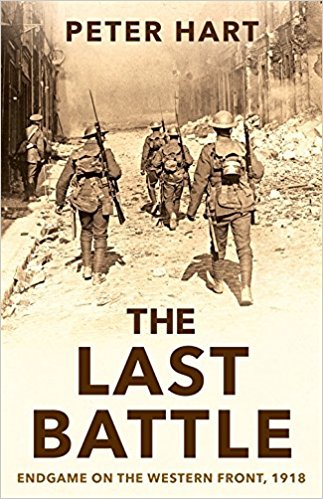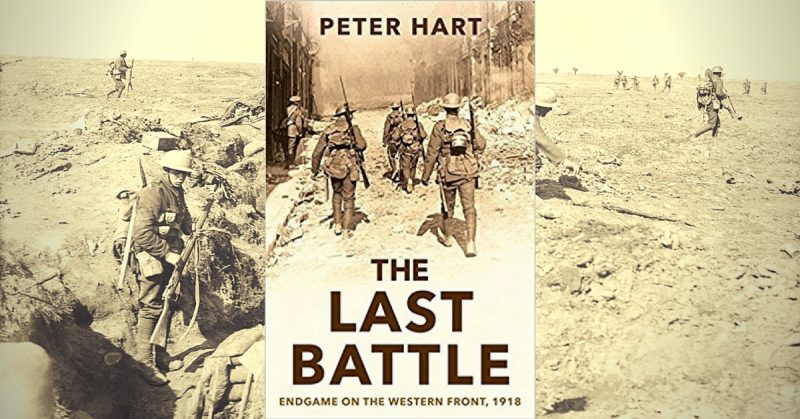Commemorations marking the centenary of the Great War are only just getting going in the United States, but for the UK and other countries involved in the conflict from the start, 2018 sees the final year of a mixed series of events, some of which have been best avoided. I tend to shy away from occasions where event junkies seem to gather so they can get likes on social media and it strikes me there have been too many opportunities for that nonsense. But 2018 leaves me little option but to find something suitable to attend come November. I feel compelled and books like this from the ever-reliable Peter Hart impress upon me how important honouring the end of the centenary is.
Put in simple terms, 1918 was a year of movement of a scale not experienced on the Western Front since four years earlier. There are many books about the German spring offensive and I guess devotees have their favourites, but the Hundred Days, the March to Victory, call it what you will, when the Allies went on the offensive to finish the war deserves serious consideration and for all his humour on the battlefield trail, over a few beers or belting out a cheeky song or two, when it comes to the history Peter is never anything but serious.
We see how Ferdinand Foch guided the Allies to victory on the battlefield through the sequence of crushing offensives that marked the final phase of the war, as Pershing’s doughboys found their feet, where the French attempted to shake off their collective exhaustion and the British put so many cruel lessons to good use. Mr Hart acknowledges the contributions of all the forces in the Allied army and takes care to snuff out a few post war myths bandied about in the name of a narrow nationalism.
He looks at the political situation in Germany and explains how a ruined country was brought to its knees amid so much suffering with violent revolution taking hold thanks to the failed ambitions of the Kaiser, Hindenburg and Ludendorff. This unholy mess is set against the undoing of Germany’s allies as Turkey and Bulgaria dropped out just as the Austro-Hungarian Empire began to crumble.
While plans for the war continuing into 1919 were well in hand amid speculation it might even go on until 1920, Douglas Haig was enticed by the possibility the conflict would end before the year was out but although he was proved correct and his armies could claim perhaps the greatest victory of any British army in history he would find the taste of success made bitter by his political enemies, led by the unscrupulous David Lloyd George and Winston Churchill. They would capitalise on his early death in 1928 by traducing his memory to deflect from their own failures, safe from any response.
Haig’s armies had come so far in terms of experience and ability and success in 1918 was their victory in every sense but it was shared with a French army at the end of its tether after so much sacrifice and a vastly expanded American force learning the hard way that it must walk before it could run. The French had shouldered so much of the burden during the early years of the war and had endured eye watering casualty figures to recover their homeland from the enemy. The false hope of Nivelle and the subsequent mutinies only added to the pain. But the French fought on to the end with all the determination and skill they could muster.
The battles of 1918 had seen a bloody initiation for the Americans who made huge strides to expand a small peacetime army into a force capable of being a war-winning machine. They had much to learn and experienced all the trials and tribulations that attend such an expansion, but they got on with it. Pershing insisted American forces would not be used piecemeal within the British and French armies as Foch and Haig had hoped. They would fight together as one and their contribution to final victory speaks for itself.
Allied soldiers advanced across a terrible country of ransacked villages and ruined infrastructure as the Germans carried out a scorched earth policy destroying everything of value as they retreated. Booby traps were a constant threat and took their toll of the unwary. The tragedy of the people killed in the last days and hours of the war cannot be understated. Some of these figures are well known to history, so Mr Hart finds others for us to reflect upon as we read of those sad moments before the Armistice came into effect. The scale of the destruction left by the conflict would take years to repair and leave France seeking a vengeful mix of restitution and retribution at the end of the war. But when the fighting stopped the abiding wish of just about everybody was to get home, however uncertain the future might be.
I set out to help improve myself by reading books after five pointless years at secondary school and despite forays into random bits of fiction it has always been history that has appealed to me. Four and a bit decades on from the sixteen year old me and I like to think I haven’t done so badly and although I have many favoured authors recording the Second World War I can say much the same of many Great War specialists and this all leads to this latest work from Peter Hart, a consistent writer who has the skill of a fine storyteller. This latest book betrays a sense he has reached a conclusion of his own to coincide with the centenary of the end of a conflict he has covered with such clarity and passion. Hopefully we will see more from Peter in good time, and if you are wise enough to read The Last Battle, it should lead you to his earlier work. You will not be disappointed.
Reviewed by Mark Barnes for War History Online

THE LAST BATTLE
Endgame on the Western Front, 1918
By Peter Hart
Profile Books
ISBN: 978 1 78125 482 0
